人教版七年级英语下册第二单元
人教版七年级英语下册Unit2_单元话题满分作文
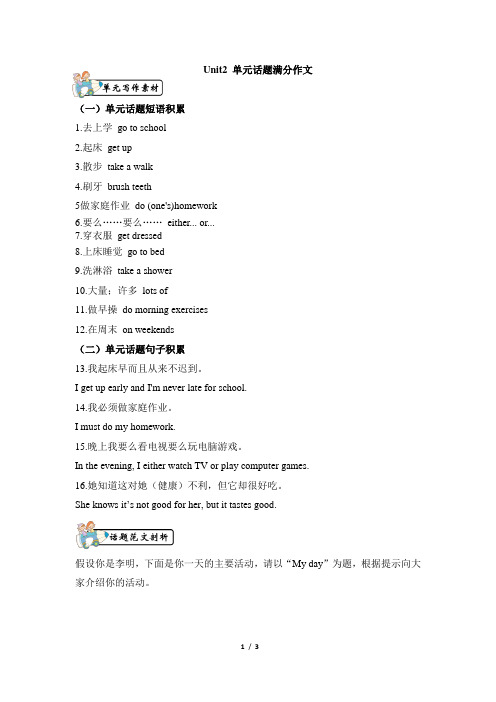
Unit2 单元话题满分作文(一)单元话题短语积累1.去上学go to school2.起床get up3.散步take a walk4.刷牙brush teeth5做家庭作业do (one's)homework6.要么……要么……either... or...7.穿衣服get dressed8.上床睡觉go to bed9.洗淋浴take a shower10.大量;许多lots of11.做早操do morning exercises12.在周末on weekends(二)单元话题句子积累13.我起床早而且从来不迟到。
I get up early and I'm never late for school.14.我必须做家庭作业。
I must do my homework.15.晚上我要么看电视要么玩电脑游戏。
In the evening, I either watch TV or play computer games.16.她知道这对她(健康)不利,但它却很好吃。
She knows it’s not good for her, but it tastes good.假设你是李明,下面是你一天的主要活动,请以“My day”为题,根据提示向大家介绍你的活动。
要求:1.包含表格中提供的信息,可适当发挥;2.短文中不得出现任何真实的人名、校名及其他相关信息;3.不少于60词。
◆◆思路点拨My DayMy name is Li Ming I'm a student. I have a busy day.I get up at seven o' clock and get dressed at five past seven in the morning. Then I have breakfast. I go to school at seven thirty and i get to school at eight o'clock. At half past eight we have our classes. Every day we have six classes. After school I go home. I do my homework at six thirty. I go to bed at nine thirty in the evening.This is my day. What about you?AMy DayToday is Monday. I get up at 6:00. I have my breakfast at about 6:30. Then I clean my room, wash my face and brush my teeth. I have noodles for breakfast. I go to school at 7:00. I do morning exercises at 7:50. We have four classes in the morning. At 11:30, I have lunch at school. We have two classes in the afternoon. I have computer and art classes. I like them very much. I go home at 5:30. I do my homework first when I get home. I'm happy today.BDear rick,How's it going? Now let me tell you something about my daily(日常的)lire. On school days, I always get up at six. I have breakfast at a quarter past seven. I go to school at eight. I am never late for school. I have lunch at school. After school, I play ping-pong or basketball for half an hour. I often take a walk after dinner. Then I do my homework. I go to bed at half past nine.Could you tell me about your life?Yours,Bill。
人教版英语七年级下册Unit2 单元核心知识点精讲练

Unit2 单元核心知识点精讲练【短语】what time几点,什么时候go to school去上学get up起床take a shower淋浴,洗澡put on穿上go to work去上班get to到达listen to听get back 归还,取加get home 到家get go 到达get for 为某人拿(取)买get from从某人/某物那得到……go to bed上床睡觉do homework做作业go home回家【句型】1.What time do you…? 你什么时间……?2.What time does / he? …他什么时间……?3.What time is it? It’s…. 几点了?是……。
4.She takes shower at …她经常在…淋浴。
【口语】1.What time is it? 几点了?2.-What time do you usually get up?你通常几点起床?3.-I usually get up at five o’clock.通常5点钟起床。
4.-What time does he eat breakfast?他什么时候吃早饭?5.-He eats breakfast at seven o’clock.他七点钟吃早饭。
【语法】1.一般现在时:主语为第三人称单数,动词为第三人称单数形式2.学习时间的表达法二.难点讲评1.What time do you get up?释:这是一个由疑问词what time(几点)引导的特殊问句。
其结构:What time +助动词do/does +主语+动词原形,询问某人做某事的具体时间。
例如:what time do you begin class in the morning?你们早晨几点开课?注:What’s the time=What time is it?也是用来询问时间,意为“几点了”。
人教版七年级下册英语Unit2 What time do you go to school教材听力原文及译文

Unit 2 What time do you go to school? Section A1b Listen and match the times with the actions. Draw lines from the clocks to the pictures.Interviewer: What time do you usually get up, Rick? Rick: Um, I usually get up at six thirty.Interviewer: And what time do you brush your teeth and take a shower?Rick: I brush my teeth and take a shower at six forty. Interviewer: Hmm. What time do you eat breakfast? Rick: Seven o’clock.Interviewer: And what time do you usually get dressed?Rick: I usually get dressed at seven twenty. Interviewer: And my last question. What time do you go to school?Rick: I usually go to school at seven thirty. Interviewer: Thank you.2a Listen to the conversation and complete the sentences.Interviewer: You have a big family, don’t you, Jim? Jim: Yes, I have two brothers and two sisters.Interviewer: Wow! How many showers do you have? Jim: We only have one shower.Interviewer: Is that difficult?Jim: No, because we have a shower schedule. My brother Bob takes a shower first at five thirty.Interviewer: Wow! That’s early!Jim: Yeah. Then my sister Mary takes a shower at five fifty. Next my brother Jack takes a showerat six fifteen. I take a shower at six thirty, mysister Anna at six forty-five…2b Listen again. Complete the shower schedulefor Jim’s family.Interviewer: You have a big family, don’t you, Jim? Jim: Yes, I have two brothers and two sisters.听录音,将时间和活动配对。
人教版初一七年级英语(下)第二单元Unit2知识点+语法整合
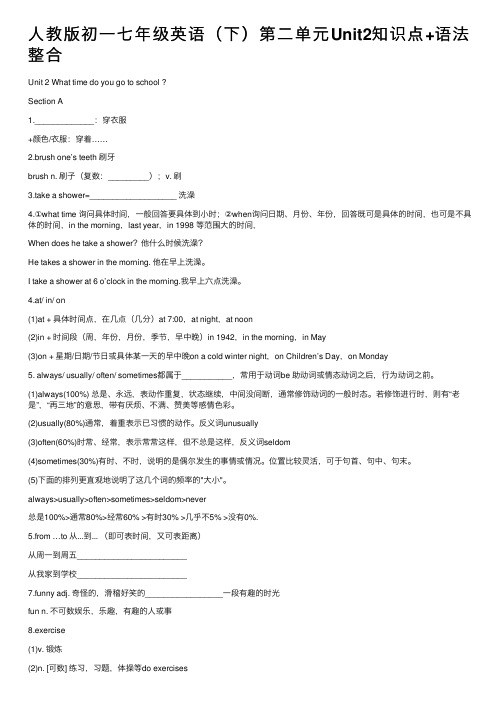
⼈教版初⼀七年级英语(下)第⼆单元Unit2知识点+语法整合Unit 2 What time do you go to school ?Section A1._____________:穿⾐服+颜⾊/⾐服:穿着……2.brush one’s teeth 刷⽛brush n. 刷⼦(复数:_________);v. 刷3.take a shower=___________________ 洗澡4.①what time 询问具体时间,⼀般回答要具体到⼩时;②when询问⽇期、⽉份、年份,回答既可是具体的时间,也可是不具体的时间,in the morning,last year,in 1998 等范围⼤的时间,When does he take a shower?他什么时候洗澡?He takes a shower in the morning. 他在早上洗澡。
I take a shower at 6 o’clock in the morning.我早上六点洗澡。
4.at/ in/ on(1)at + 具体时间点,在⼏点(⼏分)at 7:00,at night,at noon(2)in + 时间段(周,年份,⽉份,季节,早中晚)in 1942,in the morning,in May(3)on + 星期/⽇期/节⽇或具体某⼀天的早中晚on a cold winter night,on Children’s Day,on Monday5. always/ usually/ often/ sometimes都属于___________,常⽤于动词be 助动词或情态动词之后,⾏为动词之前。
(1)always(100%) 总是、永远,表动作重复,状态继续,中间没间断,通常修饰动词的⼀般时态。
若修饰进⾏时,则有“⽼是”,“再三地”的意思,带有厌烦、不满、赞美等感情⾊彩。
(2)usually(80%)通常,着重表⽰已习惯的动作。
七年级人教版英语下册,第二单元

第二单元:My day(我的一天)第一节:词汇1. My day(我的一天)2. get up(起床)3. have breakfast(吃早餐)4. go to school(上学)5. have lunch(吃午餐)6. do homework(做作业)7. have dinner(吃晚餐)8. go to bed(睡觉)9. d本人ly routine(日常生活)第二节:语法1. 一般现在时2. 表示习惯性动作3. 肯定句、否定句和疑问句4. 特殊疑问词的使用第三节:对话1. A: What time do you get up every day?B: I get up at 6:30.2. A: What do you do in the evening?B: I do my homework and then have dinner. 第四节:练习1. 选择填空2. 完成对话3. 写作:描述你的一天第五节:文化背景1. 不同国家的日常生活习惯2. 中西方对时间的看法差异3. 日常生活与健康的关系第六节:拓展学习1. 观看相关视瓶或听力材料2. 了解其他国家的日常生活习惯3. 阅读相关文章或小说第七节:小结通过本单元的学习,学生能够掌握描述日常生活的基本词汇和语法结构,能够用英语表达自己的一天生活,并了解不同国家的生活习惯,培养对日常生活的观察和思考能力,为今后学习和生活打下基础。
在学习这个单元的过程中,学生需要多做听、说、读、写的练习,培养语言运用能力。
老师也可以引导学生在课外进行拓展学习,了解更多与日常生活相关的知识,拓宽视野,丰富学习内容。
学生在学习外语的过程中,要注重实际运用,多与同学、老师交流,参与课堂活动,积极表达自己的想法,提高语言表达能力和交流能力,达到真正的语言交际目的。
第二单元:My day(我的一天)第八节:词汇进阶在前面的词汇部分中,我们已经学习了一些关于日常生活的基本词汇,例如get up(起床)、have breakfast(吃早餐)、go to school (上学)等,这些都是描述我们每天生活中的重要动作和活动。
人教版英语七年级下册Unit2【重点短语+词法语法句法精讲】
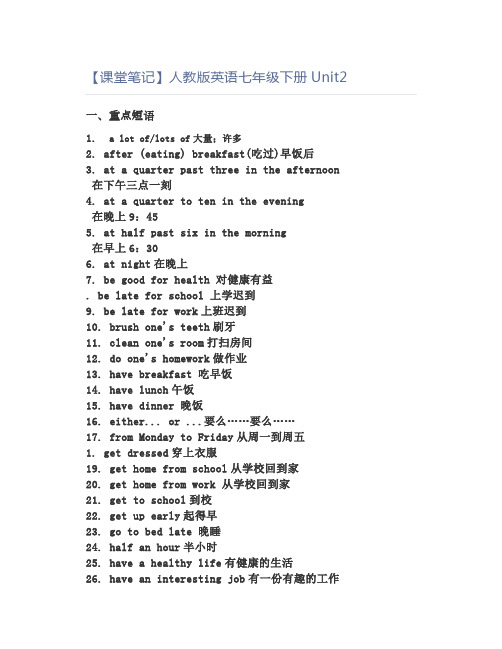
【课堂笔记】人教版英语七年级下册Unit2一、重点短语1. a lot of/lots of大量;许多2. after (eating) breakfast(吃过)早饭后3. at a quarter past three in the afternoon 在下午三点一刻4. at a quarter to ten in the evening在晚上9:455. at half past six in the morning在早上6:306. at night在晚上7. be good for health 对健康有益. be late for school 上学迟到9. be late for work上班迟到10. brush one's teeth刷牙11. clean one's room打扫房间12. do one's homework做作业13. have breakfast 吃早饭14. have lunch午饭15. have dinner 晚饭16. either... or ...要么……要么……17. from Monday to Friday从周一到周五1. get dressed穿上衣服19. get home from school从学校回到家20. get home from work 从学校回到家21. get to school到校22. get up early起得早23. go to bed late 晚睡24. half an hour半小时25. have a healthy life有健康的生活26. have an interesting job有一份有趣的工作27. take a walk散步2. on school nights在上学的晚上29. take a shower洗淋浴30. work at a radio station在电台工二、重点句型1.—What time/When do you usually exercise?你通常什么时候锻炼?—I usually exercise at five o'clock.我通常在5点锻炼。
人教七年级下册英语unit2知识点总结
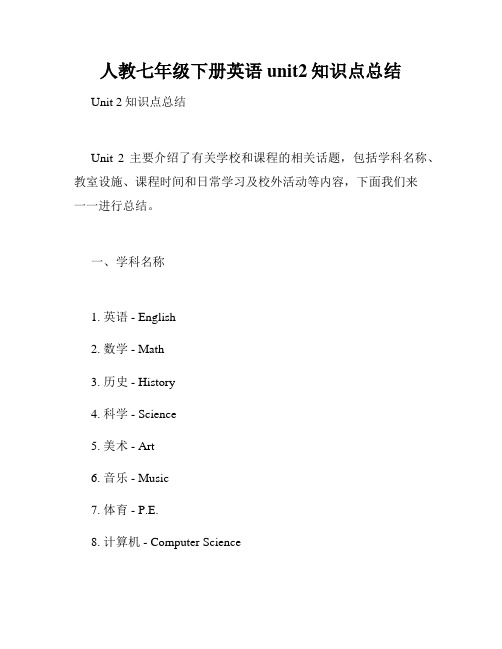
人教七年级下册英语unit2知识点总结Unit 2知识点总结Unit 2主要介绍了有关学校和课程的相关话题,包括学科名称、教室设施、课程时间和日常学习及校外活动等内容,下面我们来一一进行总结。
一、学科名称1. 英语 - English2. 数学 - Math3. 历史 - History4. 科学 - Science5. 美术 - Art6. 音乐 - Music7. 体育 - P.E.8. 计算机 - Computer Science二、教室设施1. 黑板 - blackboard2. 白板 - whiteboard3. 投影仪 - projector4. 音响 - sound system5. 地图 - map6. 水龙头 - tap7. 电视 - TV8. 电脑 - computer9. 灯 - light10. 窗户 - window三、课程时间1. 上午 - in the morning2. 下午 - in the afternoon3. 晚上 - in the evening4. 早上 - in the early morning5. 夜晚 - at night6. 每周 - every week7. 每天 - every day8. 周末 - on weekends四、日常学习1. 做作业 - do homework2. 练习 - practice3. 复习 - review4. 读书 - read books5. 写作 - write compositions6. 讨论 - have discussions7. 板书笔记 - take notes8. 教师讲解 - teacher's explanation9. 学习笔记 - study notes10. 做练习 - do exercises五、校外活动1. 课外活动 - extracurricular activities2. 运动会 - sports meeting3. 聚会 - party4. 社交活动 - social activities5. 英语角 - English corner6. 爱好小组 - hobby group7. 社团活动 - club activities8. 学校之旅 - school trip以上就是Unit 2的主要内容,希望能够帮助大家更好地学习英语,更好地了解学校和课程的相关话题。
人教版七年级下册英语第二单元知识点
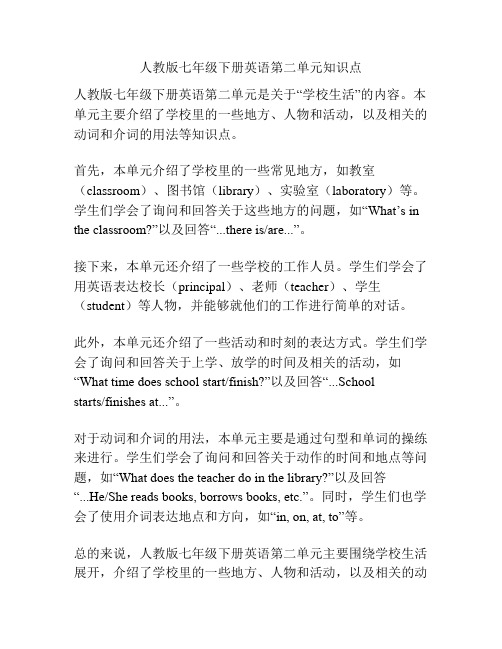
人教版七年级下册英语第二单元知识点人教版七年级下册英语第二单元是关于“学校生活”的内容。
本单元主要介绍了学校里的一些地方、人物和活动,以及相关的动词和介词的用法等知识点。
首先,本单元介绍了学校里的一些常见地方,如教室(classroom)、图书馆(library)、实验室(laboratory)等。
学生们学会了询问和回答关于这些地方的问题,如“What’s in the classroom?”以及回答“...there is/are...”。
接下来,本单元还介绍了一些学校的工作人员。
学生们学会了用英语表达校长(principal)、老师(teacher)、学生(student)等人物,并能够就他们的工作进行简单的对话。
此外,本单元还介绍了一些活动和时刻的表达方式。
学生们学会了询问和回答关于上学、放学的时间及相关的活动,如“What time does school start/finish?”以及回答“...Schoolstarts/finishes at...”。
对于动词和介词的用法,本单元主要是通过句型和单词的操练来进行。
学生们学会了询问和回答关于动作的时间和地点等问题,如“What does the teacher do in the library?”以及回答“...He/She reads books, borrows books, etc.”。
同时,学生们也学会了使用介词表达地点和方向,如“in, on, at, to”等。
总的来说,人教版七年级下册英语第二单元主要围绕学校生活展开,介绍了学校里的一些地方、人物和活动,以及相关的动词和介词的用法。
通过学习这些知识点,学生们可以更好地了解和应用英语,并能在日常生活中进行相关的交流和表达。
人教版七年级下册英语第二单元主要围绕学校生活展开,介绍了学校里的一些地方、人物和活动,以及相关的动词和介词的用法。
通过学习这些知识点,学生们可以更好地了解和应用英语,并能在日常生活中进行相关的交流和表达。
